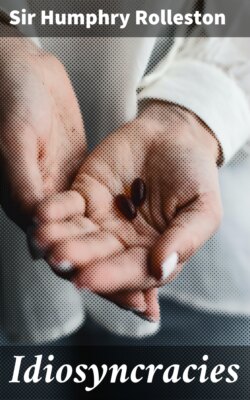Читать книгу Idiosyncracies - Sir Humphry Rolleston - Страница 4
Psychological Idiosyncrasies.
Оглавление(1) Psychological idiosyncrasies must be distinguished from eccentricities, whether of geniuses or others, for being concerned with abnormalities of manner and conduct, they may merge into mental disorder. Psychical tics of a harmless character might be thought to resemble idiosyncrasies, for example Dr. Samuel Johnson, whose strange gestures and grimaces may be regarded as evidence of habit spasm or a physical tic, was impelled to touch certain posts, to count his steps carefully as he walked along the streets, and even to retrace his steps to complete this duty. But tics are evidence of degeneracy and of a neuropathic taint, which may, like idiosyncrasies, be hereditary. In a tic there is an irresistible impulse to do something, whether it be trivial or of a serious nature. In the other direction idiosyncrasies help to make up character by forming distinctive traits, and so merge into temperamental features.
Psychological idiosyncrasies may, like the more familiar abnormal physiological reactions, be formally separated into the two groups of (1) abnormal insensitiveness to mental stimuli, e.g. the peculiarly thick-skinned individuals who are not morbidly selfish, proud, or the subjects of a disease, such as myxoedema, which blunts sensibility, (2) greatly exaggerated sensitiveness, which includes unusual antipathies and sympathies. Brief reference to these antipathies may now be made. It has been suggested that some apparently unreasonable antipathies may really be modified idiosyncrasies of physical origin, or alternatively may be due to some change in the sense organs.
According to Shylock (Merchant of Venice, Act IV, Scene 1)
“Some men there are love not a gaping pig
Some that are mad if they behold a cat.”
A horror of cats affected such prominent men as Napoleon, Wellington, Lord Roberts, Henry III of France; Tycho Brahé fainted at the sight of a fox, Marshal d’Albert at that of a pig, and the Duc d’Epernon at a leveret but not at a hare. The smell of fish was most obnoxious to Roger Ascham[13] and was said to have made his contemporary Erasmus feel feverish; and the hereditary antipathy to the odour of cheese has been sufficiently strong to cause syncope. It might be possible to explain these effects as analogous to horse-, dog-, and cat-asthma and due to inhalation of animal protein. Dr. Mackenzie Wallis has told me of two patients with an antipathy to cats, in whom skin tests showed sensitiveness to cat extract and minute injections of that extract brought about de-sensitization, so that the antipathy disappeared. In other instances it would seem more probable that such strange antipathies depend on some peculiarity of the ideational and emotional centres, and so are really evidence of disordered intellect and imagination, and are due to auto-suggestion and hysteria. Thus a clergyman fainted whenever a certain verse in Jeremiah was read; and another man swooned at the mention of a surgical operation; a third became alarmingly giddy whenever a great height was described. What explanation shall be given of the “natural hydrophobiacs”[14] who as a hereditary peculiarity dislike fluids so much that even when feverish they refrain from drinking?
Other cases may perhaps be explained by the influence of some memory buried in the unconscious mind. Robert Boyle[15] (1627-1691), to whom medicine owes much in many ways, especially for his advocacy of simple medicines instead of the elaborate mixtures then in vogue, fainted when he heard the sound of splashing water, an example which one Nicanor, according to Hippocrates, had set by doing likewise at the music of the flute. Some immediate personal dislikes, which are the converse of love at first sight, may have the same origin or be in some queer way instinctive. It has been suggested that incompatibility of married couples may possibly have some relation to incompatibility of their red blood corpuscles, but in the light of the four blood groups and a fair number of happy marriages, this seems rather a startling flight of fancy.[16]
The unreasoning character of personal antipathies was well expressed in Martial’s famous epigram (I. 32)—
“Non amo te, Sabidi, nec possum dicere quare
Hoc tantum possum dicere, non amo te,”
Tom Brown (1663-1704), “of facetious memory,” when an unruly undergraduate at Christ Church, Oxford, was “hauled” by the Dean, Dr. John Fell (1625-1686), who promised to overlook his misdeeds if he could translate the above epigram ex tempore, and thus unwittingly made his name known, in a way that it would not otherwise have been, until this present, for Brown promptly replied with the quatrain
“I do not like you, Dr. Fell—
The reason why I cannot tell;
But this I know, and know full well,
I do not like you, Dr. Fell.”
The importance of mental idiosyncrasies, such as antipathies expressed in shades of manner, in ordinary life need not be laboured; in political emergencies they may have a momentous influence on the fate of nations.
